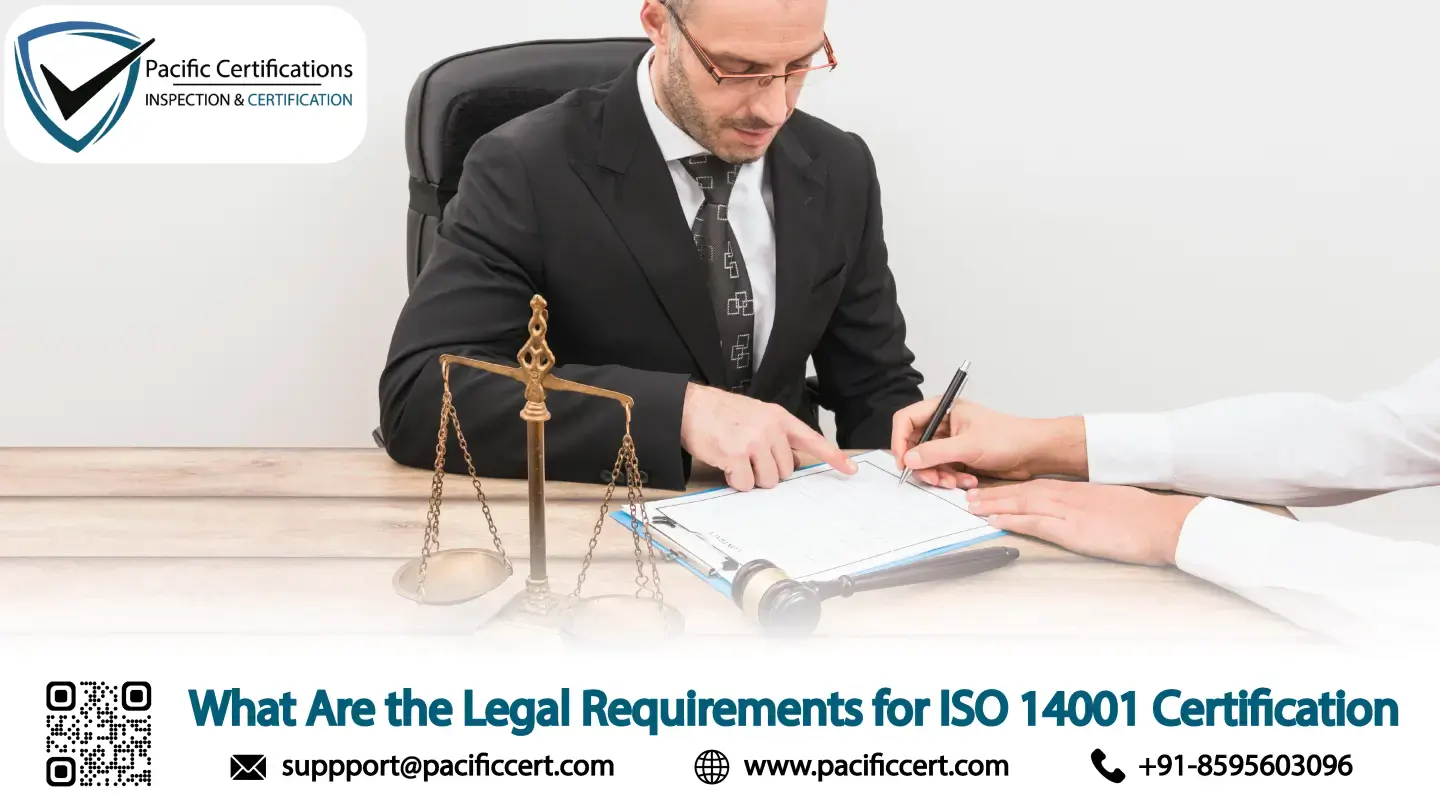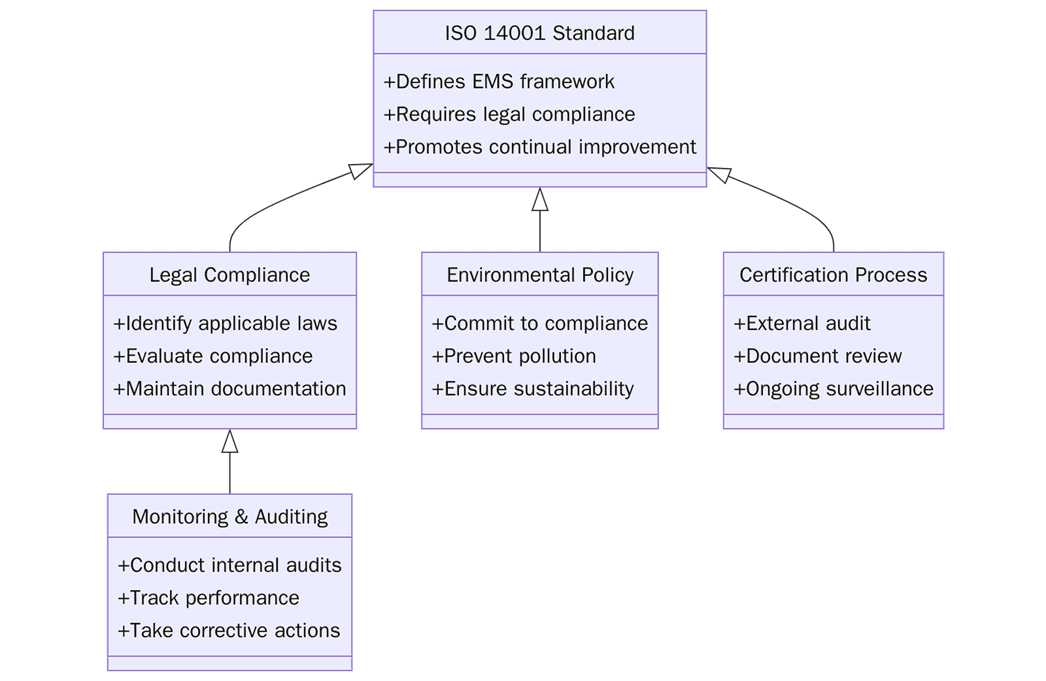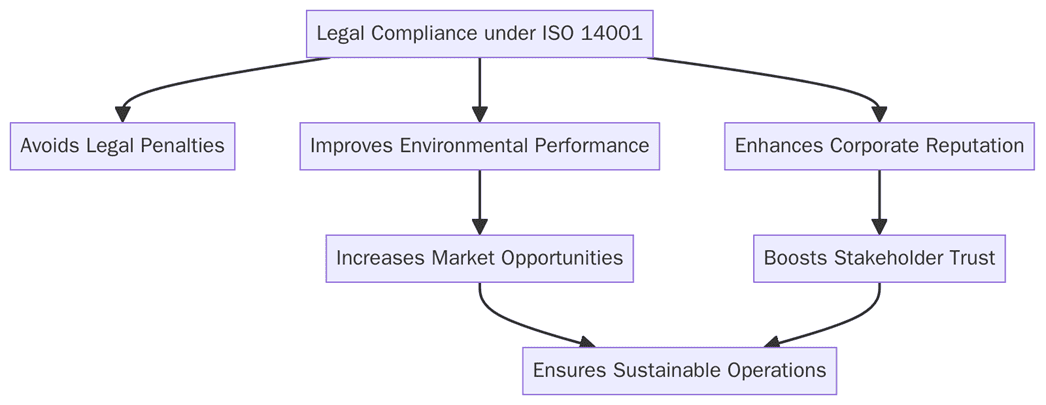What Are the Legal Requirements for ISO 14001 Certification?

Introduction
Today, one of the operational expectations of every organization of any size is environmental accountability. In manufacturing, construction logistics, or services, fulfilling environmental responsibilities is more than just compliance; it establishes the reputation and sustainability of the business. The ISO 14001:2015 Environmental Management System (EMS) provides organizations with the framework to identify, manage and monitor their environmental accountability in a structured and world recognized manner.
In order to become certified- all organizations must not only ensure compliance with applicable laws pertaining to the environment: but understand the legal and regulatory requirements in their sector and region. There are laws that apply to all sectors, and variations in legislation depending on the region. Without evidence of applicable environmental laws compliance, ISO 14001 cannot be achieved.
Speak with an auditor at Pacific Certifications to understand how your organization can meet both ISO 14001 and national environmental obligations through a structured EMS audit plan.
Quick summary
Legal requirements under ISO 14001 are centred on an organization’s obligation to identify, access and comply with environmental laws and other binding commitments. This includes national, regional and local legislation governing air emissions, waste disposal, chemical use, water quality, noise and biodiversity protection. Compliance must be verified through documented evidence, monitoring records and periodic evaluations.
In simple terms, ISO 14001 requires organizations to “know their legal duties, plan how to meet them and prove they’re meeting them.”
Why legal compliance is essential to ISO 14001 certification?
Legal compliance is the backbone of environmental credibility. An organization may have strong sustainability programs, but if it violates environmental laws, it cannot maintain ISO 14001 certification.
By integrating legal compliance into the EMS framework, organizations not only avoid fines and penalties but also gain assurance that their operations align with national policies and international sustainability goals.
“ISO 14001 transforms legal compliance from a reactive activity into a continuous, documented and verifiable process of environmental responsibility.”
What are the legal requirements for ISO 14001 certification?
To achieve ISO 14001 certification, organizations must demonstrate that they identify, evaluate and comply with all applicable environmental legal requirements. Below are the key obligations under the standard:

- Identify applicable legal and other requirements
Organizations must determine which environmental laws and regulations apply to their operations, products, or services. This may include air quality laws, waste management rules, water pollution standards, or hazardous substance regulations. - Maintain access to up-to-date legal information
Legal requirements evolve frequently. Organizations must have processes to stay informed about new or revised environmental legislation. - Integrate legal obligations into operational controls
Compliance measures must be reflected in procedures, instructions and training. This ensures employees understand the actions required to remain compliant. - Evaluate compliance periodically
ISO 14001 requires scheduled assessments to confirm whether legal and other obligations are being fulfilled. These evaluations must be documented and reviewed by management. - Address nonconformities promptly
When violations or risks of noncompliance are found, corrective actions must be implemented quickly and records must be maintained to show closure. - Maintain evidence of compliance
Documentation such as waste manifests, emission monitoring data, permits, licenses, inspection reports and audit records serve as evidence of legal adherence. - Demonstrate continual improvement
Legal compliance should not be a one-time exercise. Organizations are expected to enhance environmental performance over time by improving monitoring systems, training and communication.
Tip:Keep a “Legal Register” that lists every environmental law applicable to your organization, the department responsible and the compliance status. This document becomes a vital audit record during certification.
Common environmental laws linked to ISO 14001 compliance
While the specific requirements differ by country, most organizations must comply with regulations covering:
- Waste management: Safe collection, treatment and disposal of solid and hazardous waste.
- Air quality: Emission limits for pollutants, dust and greenhouse gases.
- Water management: Control of wastewater discharge and water usage permits.
- Hazardous substances: Storage, labelling and handling of chemicals in line with safety standards.
- Noise and vibration: Limits on operational and construction noise levels.
- Energy and resources: Efficiency, renewable use and reporting requirements.
- Environmental permits: Site-specific approvals and periodic renewals.
For multinational organizations, additional obligations may include compliance with EU Environmental Directives, U.S. EPA regulations, or international conventions such as the Basel and Stockholm Conventions.
How to prepare for legal compliance under ISO 14001?
Organizations should approach legal compliance as a structured process integrated into their EMS.
- Identify applicable laws and create a compliance register.
- Assign departmental responsibilities for each legal area.
- Verify permits, licenses and regulatory approvals are valid.
- Conduct internal audits focusing on environmental aspects.
- Maintain documentation of monitoring and inspections.
- Train employees on legal duties and response actions.
- Review compliance performance in management reviews.
Certification audit
Stage 1 audit: Reviews documentation, including the organization’s legal register, permits and monitoring reports.
Stage 2 audit: Verifies practical implementation of legal requirements in operations.
Nonconformities: Found gaps must be addressed with corrective evidence before certification.
Management review: Confirms leadership oversight and commitment to compliance.
Surveillance audits: Conducted annually to ensure continuous adherence to laws.
Recertification audits: Every three years to validate ongoing compliance and improvement.
What are the benefits of legal compliance under ISO 14001?
Complying with legal requirements through ISO 14001 offers wide-ranging organizational benefits. Below are the key outcomes:

- Reduced risk of penalties, fines, or litigation.
- Verified reputation for lawful and responsible operation.
- Improved trust with regulators, customers and communities.
- Increased efficiency through better environmental controls.
- Simplified reporting for ESG and sustainability disclosures.
- Safer workplace conditions and reduced environmental incidents.
- Improved data accuracy through structured monitoring.
- Enhanced supplier compliance within the value chain.
- Greater long-term resilience against regulatory changes.
Market Trends
In recent years, regulatory agencies worldwide are integrating digital environmental compliance platforms, requiring companies to report emissions, waste and water usage in real time. ISO 14001-certified organizations are increasingly using automated monitoring systems and AI-driven tools to stay updated on evolving legal obligations.
By 2030, environmental compliance will become even more data-driven, with governments adopting blockchain-based verification and AI-led risk prediction models. Organizations maintaining a certified EMS under ISO 14001 will be better prepared to meet future disclosure requirements, including carbon reporting and biodiversity impact assessments.
Training and courses
Pacific Certifications provides accredited training programs for ISO 14001, enabling professionals to manage compliance effectively:
· Lead Auditor Training: For professionals conducting environmental audits, focusing on compliance verification and risk evaluation.
· Lead Implementer Training: For environmental managers developing and maintaining compliance systems, including legal registers and operational controls.
To schedule ISO 14001 training or awareness sessions, contact [email protected].
How Pacific Certifications can help?
Pacific Certifications provides ISO 14001 certification and audit services, helping organizations verify compliance with applicable environmental laws and the ISO 14001:2015 standard.
Our audits assess documentation, legal registers, permits and environmental controls to ensure compliance evidence is complete and verifiable. We issue Certificates of Conformity following independent, accredited assessments, ensuring transparency and credibility without consultancy involvement.
To request your ISO 14001 audit plan and legal compliance assessment, contact [email protected] or visit www.pacificcert.com.
Ready to get ISO 14001:2015 certified?
Contact Pacific Certifications to begin your certification journey today!
Author: Alina Ansari
Suggested Certifications –
Read more: Pacific Blogs

